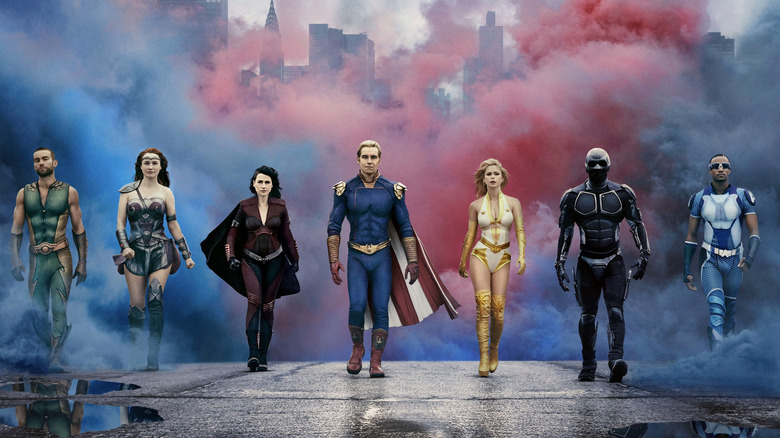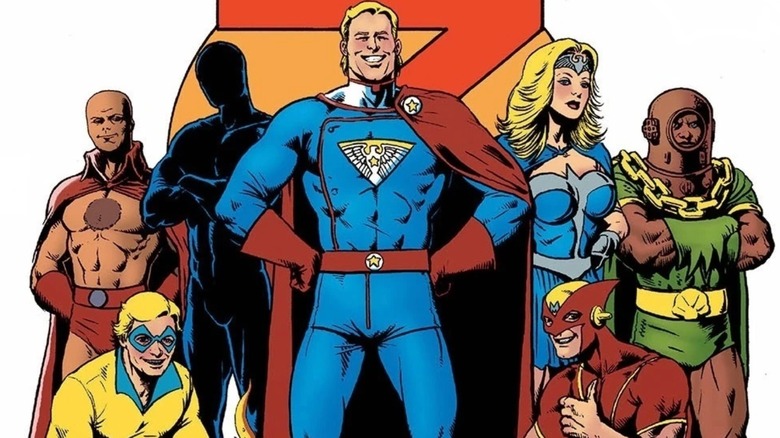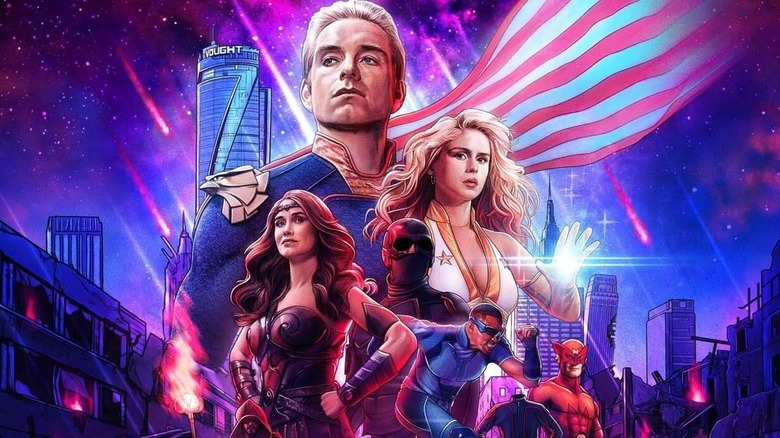The Boys Was Originally Set In The DC Universe – And The Seven Were The Justice League
Prime Video's "The Boys" was originally a comic book series co-created by writer Garth Ennis and artist Darick Robertson. In both versions, the Boys are a five-person operator squad dedicated to taking down superheroes who, when they're off-camera, are not paragons of justice. "Supes" have all the normal human capacity for depravity, but with superpowers and the absence of accountability typical of celebrities, you get wrathful, apathetic screw-ups who think they're gods. The Boys are there to remind them they're only human. Ennis put this thesis as such:
"My own take on superheroes is that if they really existed they'd be between movie stars and politicians. They'd be movie stars because they'd be glamorous and fabulous looking and the people would follow their lives exactly as if they were reading fictional adventures. But they'd be like politicians because they'd have a genuine and tangible effect on our lives and our world."
In the world of "The Boys," the world's greatest supe team is The Seven. You don't have to look too closely to figure out they're modeled on DC Comics' Justice League:
-
Homelander = Superman
-
Queen Maeve = Wonder Woman
-
Black Noir = Batman
-
A-Train = The Flash
-
The Deep = Aquaman
-
Lamplighter = Green Lantern
"The Boys" comic makes the parody even more obvious by rounding out the Seven with Jack From Jupiter, a Martian Manhunter parody replaced by the invisible Translucent (Alex Hassell) in the show.
Robertson was recently interviewed by Rolling Stone and revealed there's a good reason why The Seven take after the Justice League; Ennis originally pitched the comic as taking place in the DC Universe. Yes, there's a universe out there where in "The Boys," the titular anti-heroes fight the actual Justice League, not thinly-veiled parodies, and Homelander is the real deal Superman.
How Garth Ennis first pitched The Boys
As Robertson recalled to Rolling Stone, Ennis' first pitch for "The Boys" was about a team of private investigators living in the DC Universe and investigating the messes left behind by superheroes. If this version had been made and incorporated into the DC Universe, then the real "Superman" and "Batman" comics would be reframed as the equivalent of the propaganda Vought International puts out to sanitize the Seven. Superhero fans had only ever gotten the prettied-up versions of their favorite characters, which "The Boys" would peel back.
Ennis has written similar comics to the one he pitched as "The Boys." His "Hitman" series stars Tommy Monaghan, a superpowered criminal living in Gotham City, and features occasional DC cameos; issue #34 guest stars Superman, and surprisingly enough, Clark and Tommy hit it off. In Ennis' 1995 "Punisher Kills The Marvel Universe," Frank Castle's family is collateral damage in a superhero battle, not a gangster shoot-out, so the Punisher's vendetta is against superheroes instead (making him basically a proto-Billy Butcher).
By the time "The Boys" #1 hit shelves, the comic had already been reworked to use parody characters; Robertson claims he felt the initial idea was "unworkable" and convinced Ennis to revise it. DC Comics did publish the first six issues (under its WildStorm imprint), but "The Boys" then moved to Dynamite Entertainment for the rest of its run. According to Ennis, DC ultimately decided that even the final version of "The Boys" was a step too far:
"When you have comics that — even superficially — look a bit too much like the company's regular output, and the characters in them are doing the most ghastly things and behaving in the most awful way, and blaspheming and swearing and so on, that creates a real problem."
Would The Boys be better set in the DC Comics Universe?
The Seven being based on the Justice League in the comics meant the show inherited that DNA. This creates a bit of disconnect since the TV edition of "The Boys" parodies superhero movies more so than comics. In that arena, Marvel's Avengers have eclipsed the Justice League's fame and cultural influence. When "The Boys" began running in 2006, though, the Avengers were still the C-Team next to the Justice League and Marvel's own X-Men. If "The Boys" had begun with TV series creator Eric Kripke, not Ennis and Robertson, I think the Seven might look more like the MCU Avengers and less like the Justice League.
But is "The Boys" as a flagrant parody better or worse than Ennis' DC-rooted pitch? Is the satire less biting because Homelander isn't actually Superman? Roman à clef and parody are accepted tools of the satirist, but they're usually deployed to protect an artist from retaliation, not to sharpen a point. "The Boys" exists as it does because of DC Comics' iron-fisted copyright and public relations concerns.
On the other hand, the distance allows "The Boys" to roast the superhero genre in more general ways; it can get away with ripping on Marvel characters too (Soldier Boy is a blatant Captain America analog), which it couldn't if it was firmly tied to DC. It's not like either version of "The Boys" is subtly told either; everyone watching can tell exactly what the story is mocking (Okay, maybe not everyone).
"The Boys" may not be as big a middle finger to the Justice League as Ennis first pictured it, but the story's still got plenty of bite regardless.


